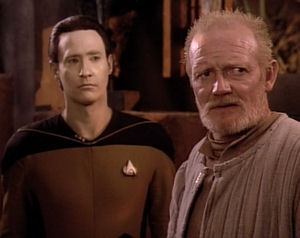I’m examining the impact Star Trek: The Next Generation had on my formation. The introduction to this series can be seen here.
After witnessing the death of cybernetics expert Ira Graves, Data starts behaving erratically.
Have you read any of Robert Heinlein’s books? He very frequently writes into the story an author’s proxy: a stand-in for himself, carrying many attributes he sees in himself. Done poorly, the author’s proxy can become a Mary Sue. But done well, it’s a solid and time-honored technique in literature. Heinlein had a very specific proxy character: an old man who was benevolently authoritarian, sexist, self-reliant and opinionated but wise. For some reason, in Heinlein’s stories, I can generally appreciate such a character. Heinlein as a writer doesn’t seem to be sanctioning everything the guy does (though I don’t doubt I find things problematic that Heinlein wouldn’t). Perhaps it’s the distance of several decades since Heinlein wrote that makes it work for me. Perhaps there is an ultimate humanity and imperfection to the characters that I rather appreciate. Perhaps it is Heinlein’s distrust of utopianism that makes his universes and characters sympathetic in general for me.
This episode’s guest character, cyberneticist Ira Graves, reminds me of that Heinlein proxy… but without the humanness. He says things like “Women aren’t people… they’re women,†and the context for that statement really doesn’t improve it at all. He’s dismissive and bullying, and easily tolerated by the culture that’s supposed to know better. A Vulcan character within the episode1 calls him “brilliant, egotistical, arrogant, chauvinistic†but there is no sense that what he’s doing is inappropriate… just sort of dated or inefficient, in a humorous way.
 Of course, the real “fun†starts when Dr. Graves deposits his personality into Data, and we watch someone with Data’s body bullying and condescending others. At first it’s considered cute; again it’s not seen as inappropriate, just humorous. Eventually he is directly insubordinate, and that gets folks’ attention. The underlying value appears to be that chauvinism and abuse isn’t wrong because of the way you’re treating people, but because it doesn’t fit well in a hierarchy when it’s directed up the chain of command. This is disturbing to find in our supposedly enlightened friends, and I’m frustrated to have this behavior modeled in a space I considered sacred by this point.
Of course, the real “fun†starts when Dr. Graves deposits his personality into Data, and we watch someone with Data’s body bullying and condescending others. At first it’s considered cute; again it’s not seen as inappropriate, just humorous. Eventually he is directly insubordinate, and that gets folks’ attention. The underlying value appears to be that chauvinism and abuse isn’t wrong because of the way you’re treating people, but because it doesn’t fit well in a hierarchy when it’s directed up the chain of command. This is disturbing to find in our supposedly enlightened friends, and I’m frustrated to have this behavior modeled in a space I considered sacred by this point.
Eventually the crew cottons on to the situation. Picard confronts Graves-in-Data, explaining that he has cheated death at the expense of someone else, whom he is treating as expendable. Picard insists that “no being is so important that he can usurp the rights of another.” This apparently eats away at Graves’ conscience, as does his inability to refrain from harming people with Data’s strength. It is a crisis resolved by Picard appealing to reason, stating a straightforward ethical truth that disturbs the “villain” of the piece enough for him to lay down his life to stop harming another. While it’s not a solution to conflict that commonly works, I’m grateful to have been told a story where it does. It is one of the simpler forms of nonviolent communication – basic truth-telling – and it is portrayed as a powerful act.
1. Dr. Selar makes this observation, one of the two awesome characters played by the awesome Suzy Plakson.
2. From http://www.emagill.com/trek/tng2-06.html
Leave a Reply